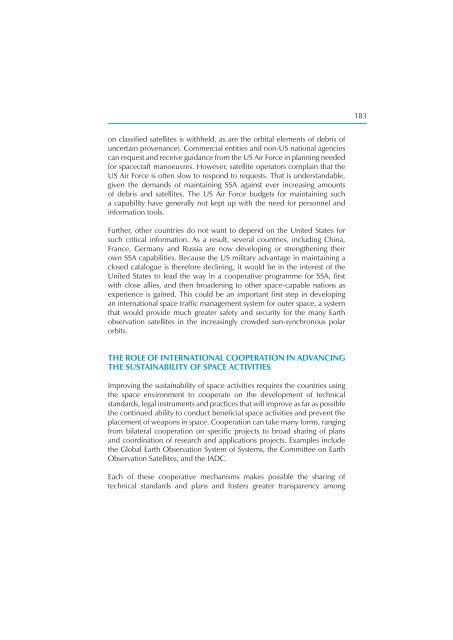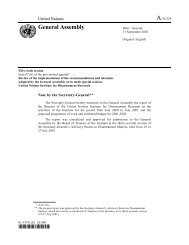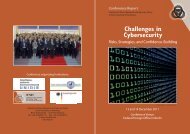Security in Space The Next Generation - UNIDIR
Security in Space The Next Generation - UNIDIR
Security in Space The Next Generation - UNIDIR
You also want an ePaper? Increase the reach of your titles
YUMPU automatically turns print PDFs into web optimized ePapers that Google loves.
on classifi ed satellites is withheld, as are the orbital elements of debris of<br />
uncerta<strong>in</strong> provenance). Commercial entities and non-US national agencies<br />
can request and receive guidance from the US Air Force <strong>in</strong> plann<strong>in</strong>g needed<br />
for spacecraft manoeuvres. However, satellite operators compla<strong>in</strong> that the<br />
US Air Force is often slow to respond to requests. That is understandable,<br />
given the demands of ma<strong>in</strong>ta<strong>in</strong><strong>in</strong>g SSA aga<strong>in</strong>st ever <strong>in</strong>creas<strong>in</strong>g amounts<br />
of debris and satellites. <strong>The</strong> US Air Force budgets for ma<strong>in</strong>ta<strong>in</strong><strong>in</strong>g such<br />
a capability have generally not kept up with the need for personnel and<br />
<strong>in</strong>formation tools.<br />
Further, other countries do not want to depend on the United States for<br />
such critical <strong>in</strong>formation. As a result, several countries, <strong>in</strong>clud<strong>in</strong>g Ch<strong>in</strong>a,<br />
France, Germany and Russia are now develop<strong>in</strong>g or strengthen<strong>in</strong>g their<br />
own SSA capabilities. Because the US military advantage <strong>in</strong> ma<strong>in</strong>ta<strong>in</strong><strong>in</strong>g a<br />
closed catalogue is therefore decl<strong>in</strong><strong>in</strong>g, it would be <strong>in</strong> the <strong>in</strong>terest of the<br />
United States to lead the way <strong>in</strong> a cooperative programme for SSA, fi rst<br />
with close allies, and then broaden<strong>in</strong>g to other space-capable nations as<br />
experience is ga<strong>in</strong>ed. This could be an important fi rst step <strong>in</strong> develop<strong>in</strong>g<br />
an <strong>in</strong>ternational space traffi c management system for outer space, a system<br />
that would provide much greater safety and security for the many Earth<br />
observation satellites <strong>in</strong> the <strong>in</strong>creas<strong>in</strong>gly crowded sun-synchronous polar<br />
orbits.<br />
THE ROLE OF INTERNATIONAL COOPERATION IN ADVANCING<br />
THE SUSTAINABILITY OF SPACE ACTIVITIES<br />
Improv<strong>in</strong>g the susta<strong>in</strong>ability of space activities requires the countries us<strong>in</strong>g<br />
the space environment to cooperate on the development of technical<br />
standards, legal <strong>in</strong>struments and practices that will improve as far as possible<br />
the cont<strong>in</strong>ued ability to conduct benefi cial space activities and prevent the<br />
placement of weapons <strong>in</strong> space. Cooperation can take many forms, rang<strong>in</strong>g<br />
from bilateral cooperation on specifi c projects to broad shar<strong>in</strong>g of plans<br />
and coord<strong>in</strong>ation of research and applications projects. Examples <strong>in</strong>clude<br />
the Global Earth Observation System of Systems, the Committee on Earth<br />
Observation Satellites, and the IADC.<br />
Each of these cooperative mechanisms makes possible the shar<strong>in</strong>g of<br />
technical standards and plans and fosters greater transparency among<br />
183








